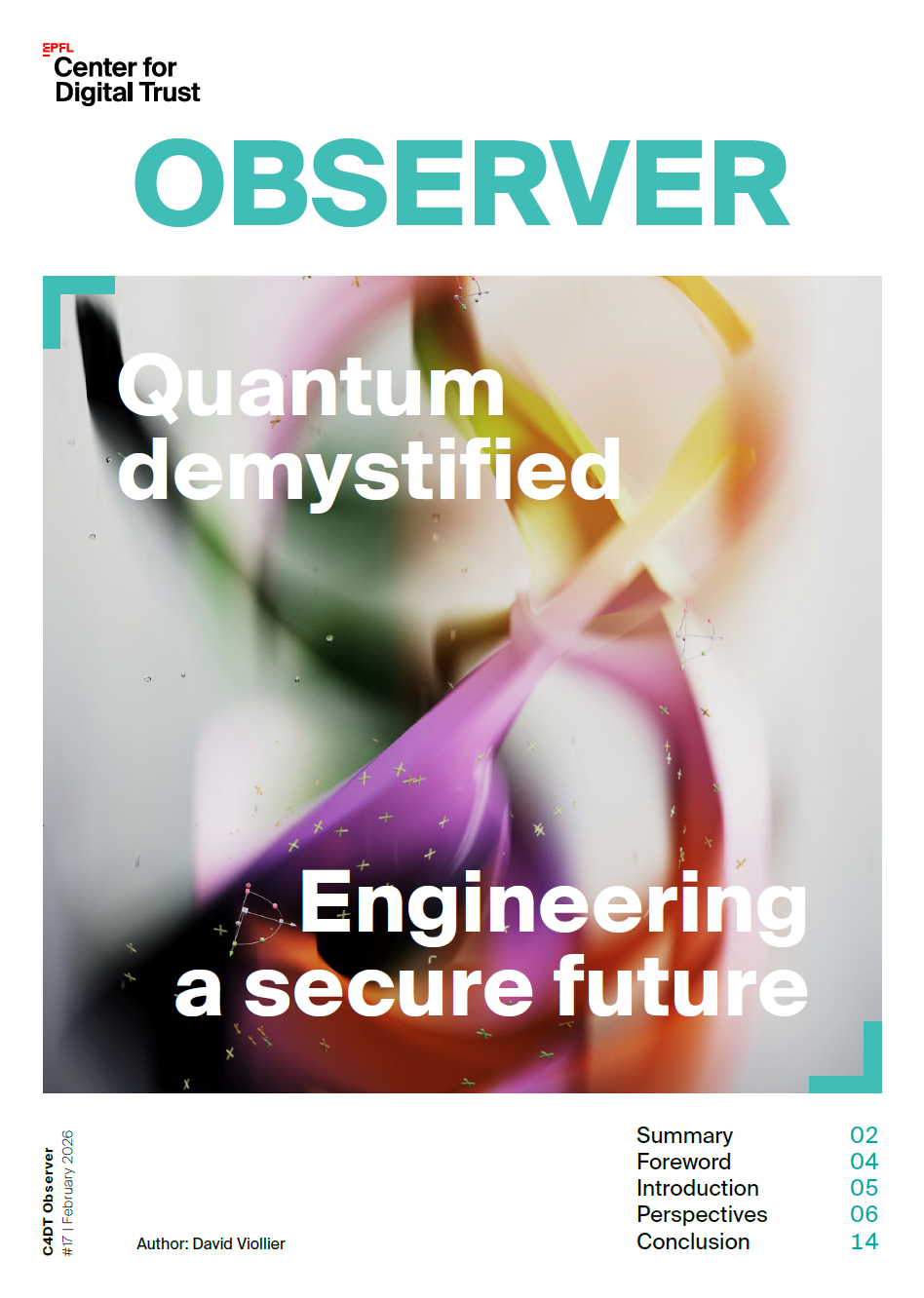2018 was a crazy year for privacy. The General Data Protection Regulation came into force in May, and new revelations on the personal data ecosystem were making headlines on a weekly basis. I will give the behind the scenes for a lot of these events, question why they didn’t happen earlier, and offer some thoughts (…)
Being able to understand fundamental data protection challenges, interpret the technical implications of cyber, data protection and privacy law, advise third parties, and communicate properly with technical experts who develop and maintain digital systems are crucial for lawyers. With these goals mind this course is developed by C4DT in close cooperation with the International Committee of the Red Cross (ICRC) and builds on the first course held for its lawyers at the end of February 2018.
Power systems (smart grids)
Data mining and machine learning
[et_pb_section fb_built=”1″ _builder_version=”3.18.2″ background_color=”rgba(255,255,255,0.03)” background_size=”contain” background_position=”top_left” custom_padding=”0|0px|20px|0px|false|false” top_divider_color=”#0091aa” top_divider_height=”44px” top_divider_flip=”horizontal” bottom_divider_height=”33px” bottom_divider_flip=”horizontal|vertical” custom_margin=”65px||”][et_pb_row custom_padding=”0|144px|0|23px|false|false” custom_padding_tablet=”|0px||7px|false|false” custom_padding_last_edited=”on|phone” _builder_version=”3.18.2″ background_size=”contain” background_position=”bottom_right”][et_pb_column type=”4_4″ _builder_version=”3.17.6″ parallax=”off” parallax_method=”on”][et_pb_text _builder_version=”3.18.2″ _dynamic_attributes=”content” text_font=”|700|||||||” background_layout=”dark” custom_margin=”||0px”]{“dynamic”:true,”content”:”post_title”,”settings”:{“before”:” “,”after”:” “}}[/et_pb_text][et_pb_text _builder_version=”3.18.2″ _dynamic_attributes=”content” text_font=”Verdana||||||||” text_font_size=”22px” text_font_size_tablet=”18px” text_font_size_phone=”16px” text_font_size_last_edited=”on|phone” text_line_height=”1.4em” background_layout=”dark”]{“dynamic”:true,”content”:”post_excerpt”,”settings”:{“before”:””,”after”:””,”words”:””,”read_more_label”:””}}[/et_pb_text][/et_pb_column][/et_pb_row][/et_pb_section][et_pb_section fb_built=”1″ _builder_version=”3.17.6″ top_divider_flip=”vertical” bottom_divider_color=”#111111″ bottom_divider_height=”44px” custom_padding=”3px|0px|54px|0px|false|false”][et_pb_row custom_padding=”|||25px” _builder_version=”3.17.6″ custom_margin_last_edited=”on|desktop”][et_pb_column type=”4_4″ _builder_version=”3.0.47″ parallax=”off” parallax_method=”on”][et_pb_code _builder_version=”3.18.2″][loop type=article paged=5 (…)
A growing number of wearable devices are becoming available. By their ability to measure physical activity and physiological characteristics such as heart rate, blood pressure, sleep patterns, etc., they constitute a cornerstone for the quantified self and personalized health. Yet, unavoidably, they bring a number of challenges in terms of security and privacy. 10:15-13:00 – (…)

A growing number of wearable devices are becoming available. By their ability to measure physical activity and physiological characteristics such as heart rate, blood pressure, sleep patterns, etc., they constitute a cornerstone for the quantified self and personalized health. Yet, unavoidably, they bring a number of challenges in terms of security and privacy.
This workshop will be held on Thursday, 6 December from 10:15-13:00, in room BC 410 at the EPFL.

The International Red Cross (ICRC) is confronted to unique information-security challenges when providing aid to disaster victims. A group of C4DT-affiliated researchers has been closely working with ICRC to better understand specific computer security challenges.
For that work, Steven Leblond and his colleagues led by professors Ford and Hubaux were awarded the Distinguished Best Paper Award at the 39th IEEE Symposium on Security and Privacy in San Francisco.

A group of lawyers and policy workers from the International Red Cross (ICRC) and other organizations concluded a computing and digital trust awareness-raising training at EPFL.The week-long course in collaboration with C4DT is intended to equip them with the tools to evaluate the impact of information systems on their humanitarian activities. The course starts from computing basics and touches cloud computing, information security and privacy preservation.
A group of lawyers and policy workers from the International Red Cross (ICRC) and other organizations concluded a computing and digital trust awareness-raising training at EPFL.The week-long course in collaboration with C4DT is intended to equip them with the tools to evaluate the impact of information systems on their humanitarian activities. The course starts from computing basics and touches cloud computing, information security and privacy preservation.

Les attaques de phishing, de plus en plus ciblées et difficiles à détecter, touchent PME, institutions et particuliers ; pour y répondre la HEIG‑VD a lancé le projet « Combattre le Phishing – quelles innovations apporter » en partenariat avec le Center for Digital Trust (C4DT) de l’EPFL, l’UNIL, la Police cantonale vaudoise, la DGNSI, (…)

This publication summarizes the key perspectives shared by participants at the roundtable “Quantum Demystified: Engineering a Secure Future”, organized by C4DT in collaboration with SICPA on September 18, 2025.
Bien qu’on nous assène que nos communications sont chiffrées de bout-en-bout, et que même WhatsApp/Meta ne peut pas les lire… il s’avère que ceci est faux et qu’elles sont bel et bien accessibles. Ceci n’impacte pas que la crédibilité de Meta, mais aussi celle de n’importe quel système numérique, quel qu’en soit l’opérateur (petit rappel (…)
Europe’s economy now largely runs on digital payments, making reliance on U.S. card rails a systemic exposure. Sanctions, policy shifts, outages, and data-access demands can all cause economic shocks. This is precisely why Wero is both interesting and timely: it is a bank-led, pan-European layer that can reduce strategic dependency. I’m eager to see transparent (…)
This article is interesting because it shifts the Moltbook debate away from sci‑fi “bot consciousness” and toward concrete security architecture risks. What could possibly go wrong when thousands of OpenClaw‑like agents —with full root access to their owners’ machines— are frolicking in a shared, untrusted environment, swapping prompts, payloads, and jailbreak tricks? His advice is (…)
Apparently, it happens even to the best of us — even seasoned professionals with over 24 years of IT experience and a ‘deep understanding of both the complexities and practical realities of infrastructure security!’ Jokes aside, this incident is fascinating: it exposes elite-level lapses in AI tool governance despite regulatory warnings, underscoring the enduring risks (…)
The volatile start to 2026 has shaken the foundation of global digital trust. Digital sovereignty has always been a running theme in the background of European conversations around tech, but this year, it is likely to be front and center, as governments and businesses scramble to seek digital solutions that provide reliable data security and (…)
The inclusion of copyrighted materials in LLMs’ training data has been a hot-button issue from the get-go. In the beginning, Big Tech’s reassurances that their models’ inner workings prevented such material to be stored, let alone accessible, were convincing enough. But new research is painting a different picture, landing the companies in hot legal waters. (…)
Parler de souveraineté numérique en Europe devient de plus en plus courant. Même si ça va prendre beaucoup d’années d’avoir un contre-poids aux grandes entreprises américaines, les solutions émergent et s’organisent. Une fois qu’il y aura de l’argent qui alimente ces solutions alternatives, open source ou pas, l’utilité de ces solutions va augmenter drastiquement.
Beyond the author’s predictions for the AI bubble’s aftermath, what struck me most was his explanation of ‘accountability sinks’—people who take the blame for AI’s mistakes. Understanding this concept, which emerges from examining AI companies’ business model, leads to a crucial insight: it’s not just white-collar workers whose jobs will be eliminated, but specifically those (…)
Encrypted messaging app Threema, which is used by the Swiss army and cantonal polices, got acquired by a German private company. Two questions come to mind. First, what kind of implications could a private acquisition such as this have on a country’s sovereignty and critical operations, and how does it deal with them? Second, and (…)




